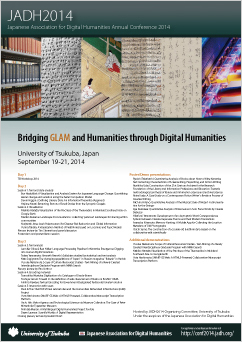Poster session 6
Development of an Asymptotic Word Correspondence System between Classical Japanese Poems and their Modern Translations
- Hilofumi Yamamoto (Tokyo Institute of Technology / University of California)
- Bor Hodošček (Meiji University)
- Hajime Murai (Tokyo Institute of Technology)
Objectives
This project will develop an automatic word concordance system for parallel texts comprising of Classical Japanese poem texts and their associated modern translations. By using these parallel texts, we will clarify the details of language change within Japanese in an objective procedural manner that is not influenced by human observations.
Problem
Many scholars of classical Japanese poetry have tried to explain the constructions of poetic vocabulary using their intuition or the experiences they accumulated during their studies. Thus, they often produce modern Japanese translations through means of holistic explanations of each poem since they, even as specialist in classical Japanese poetry, cannot adequately explain the precise meanings of all words. Even if they could clearly explain all the words, their translations could include contradictions with their own explanations. This shows that translations include possibilities of non-literal elements, which are not expressible using ordinary word explanations.
To find the non-literal elements, we cannot manually match classical words in poem texts with modern words in translation texts. The problem of manual matchings of word for word from a parallel corpus, especially one comprised of classical texts, is that the act of judgment in identifying correspondences can lead to a loss of the original meaning of a word, since our present knowledge of classical words is conjectured and classified based on our knowledge of modern language.
To this end, it is necessary to employ computer assisted correspondence methods without relying on this human knowledge. We therefore use the asymp- totic correspondence vocabulary presumption method (Murai, 2012) to estimate corresponding pairs of classical Japanese words and their modern Japanese translations.
Methods
Using the asymptotic correspondence vocabulary presumption method to classic texts and those modern translations, the proposed method allows the extraction of corresponding vocabulary pairs. A word in a poem text will be paired with every word in the corresponding translation text of the poem. This process is repeated for all of the words in the poem using our program. Our system will generate poem-word and translation-word patterns from Kokinshū poem #1 to #1000 respectively. Based on the frequency data of poem-word and translation-word patterns, we calculate mutual information (MI) scores for each pair. Then, for each iteration, we determine the best-scoring corresponding pair. After determining the best-scoring pair words, we remove all occurrences of it from both poem texts and translation, recalculate the MI scores with the re- maining pairs, and finally determine the second best-scoring pair. This process is repeated until the MI score goes below a certain preset threshold value.
Materials
We will use the Kokinshū with ten corresponding sets of modern translations. The Kokinshū is an anthology compiled under imperial orders (ca.905). The Kokinshū consists of 1,111 poems including long poems (chōka) and head-repeating poems (sedōka) which are not short poems (tanka; 5/7/5/7/7 syllable style). We will only use the short poem form, which amounts to 1,000 poems, for stylistic consistency. The ten sets of modern translations of the Kokinshū are translated from 1927 to 1998 by ten Japanese poetry scholars.
This project has already begun: the parallel corpus of the Kokinshū has been constructed. We are now working on the development of computer software and the optimization of the calculation methods. As a result of our development and experimentation, we expect that literal words and non-literal elements will be extracted using our system.
- Keywords
- corpus linguistics, word correspondences, classical Japanese poetry, modern translations, asymptotic algorithm
Reference
- Murai, Hajime: “Semantic Networks between Texts in Different Language Based on the Asymptotic Correspondence Vocabulary Presumption Method,” The Computers and the Humanities Symposium, Vol. 2012, No. 7, pp. 61–68, Nov (2012).

